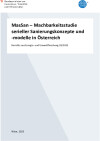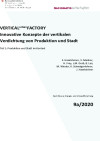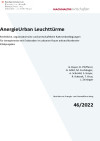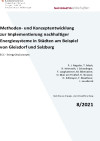Suchergebnisse
VERTICALurbanFACTORY
The project researches possibilities and potentials of highly efficient use of space through modern concepts of "stacked" functions and vertical production.
INNERGY - Reallabor im zentralen Inntal für klimaneutrale semiurbane Gebiete
Die Potentiale von Bestandsquartieren und Industriebetrieben für eine nachhaltige Energieversorgung wurden in einem kleinstrukturierten Gebiet ganzheitlich und sektorenübergreifend erhoben und konkrete Umsetzungsprojekte für eine klimaneutrale Region ausgearbeitet.
plusenergy-FLAGSHIP: Plusenergie-Bürogebäude 2.0 - die viadonau Unternehmenszentrale
Für die neue Unternehmenszentrale der viadonau (via donau - Österreichische Wasserstraßen-Gesellschaft m.b.H.) sollen im Zuge des gegenständlichen Projekts verschiedene Innovationen in Richtung eines „Plus-Energie Standard 2.0“ umgesetzt und in einem Gesamtkonzept vereint werden.
plusenergy-FLAGSHIP: Plus-Energy office building 2.0 - the viadonau headquarters
In the course of this project, various innovations towards a "Plus-Energy Standard 2.0" are to be implemented and combined in an overall concept for the new viadonau headquarters (via donau - Österreichische Wasserstraßen-Gesellschaft m.b.H.).
INNERGY - Real laboratory in the central Inn-valley for climate-neutral semi-urban areas
Sustainable energy supply solutions for existing quarters and industry had been surveyed holistically and cross-sectorally in a small-structured area, consequently pilot projects had been elaborated with the aim to build up a climate-neutral region.
EnergyCityConcepts (ECC) - Methoden- und Konzeptentwicklung zur Implementierung nachhaltiger Energiesysteme in Städten am Beispiel von Gleisdorf und Salzburg
Im gegenständlichen Projektvorhaben werden anhand zweier konkreter Modellregionen (Kleinstadt Gleisdorf und urbanes Stadtquartier Salzburg-Schallmoos) neue methodische Herangehensweisen (interdisziplinäre Energieraumplanung, Modellbildung und Simulation) entwickelt und erprobt. Die beiden Modellregionen verbindet dabei das ambitionierte politische Bekenntnis zu einer 100 % erneuerbaren bzw. CO2-neutralen Energieversorgung.
ECC – EnergyCityConcepts – Development of a methodology and concept for the implementation of sustainable energy systems in cities by the example of Gleisdorf and Salzburg
In the context of this project two concrete model regions (small city Gleisdorf and urban city quarter Salzburg-Schallmoos) will be developed and tested with new methodical approaches (interdisciplinary urban and regional energy planning, modeling and simulation). An ambitious political commitment of both model regions is a 100% renewable or rather CO2-neutral energy supply.
Storage Cascade MZ: Storage cascade system to establish urban PLUS energy systems on the example of the city of Mürzzuschlag
In the "Storage Cascade MZ" project, battery storage systems are implemented on different grid levels in the city of Mürzzuschlag, whose measurement data enable an integrated grid monitoring and create the basis for a future expansion of the nominal power of photovoltaic (pv) systems.
Green facades with moss plants
Development of moss-covered facade panels by selecting and testing of appropriate moss species, new water storage and adhesive substratum, Materials of the support panels and technical construction details, for year-round green, sustainable, maintenance friendly, affordable building facades
VERTICAL FARMING - Ermittlung der Anforderungsbedingungen zur Entwicklung eines Vertical Farm Prototyps zur Kulturpflanzenproduktion
Im Mittelpunkt stand die Erforschung von Grundlagen für eine neue Gebäudetypologie, der Vertikalen Farm. Urbane vertikale Lebensmittelproduktion kann zur Steigerung der Energieeffizienz von und zur Reduktion des Landverbrauchs durch Städte beitragen. Wesentliche Einflussfaktoren zur Erreichung dieser Ziele werden durch diese Grundlagenforschung offen gelegt.
Site certificate
Possibilities and requirements of transferring the Swiss “2000-Watt Site” certificate to Austria
Energiemosaik Austria - Österreichweite Modellierung und webbasierte Visualisierung von Energieverbrauch und CO2-Emissionen auf Gemeindeebene
Inhalt des Projektes ist eine alle Nutzungs- und Mobilitätsarten umfassende Modellierung und webbasierte Visualisierung von Energieverbrauch und Treibhausgasemissionen aller österreichischen Gemeinden. Die Ergebnisse können in zahlreiche energie- und klimarelevante Handlungsfelder integriert und für die Sensibilisierung von Entscheidungsträgern und Öffentlichkeit genutzt werden.
Energy Mosaic Austria - Austrianwide modelling and web-based visualisation of energy consumption and greenhouse gas emissions on local level
The project consists of a modelling and a web-based visualisation of energy consumption and greenhouse gas emissions of all Austrian cities and municipalities considering all kinds of land use and mobility. The results deliver a sound basis for numerous energy and climate relevant fields of action and for awareness raising of decision makers and the public.
MasSan - Machbarkeitsstudie serieller Sanierungskonzepte & -modelle in Österreich

Machbarkeitsstudie zur Darstellung und Analyse der Rahmenbedingungen und Potentiale von seriellen Sanierungen großvolumiger Bauten. Dabei werden die Erkenntnisse aus nationalen Pilot-Projekten sowie von internationalen Projekten und Erfolgsmodellen extrahiert und auf ihre Umsetzbarkeit im österreichischen Kontext geprüft, bzw. die benötigten Erfordernisse für eine schnelle Verbreitung aufbereitet.
Schriftenreihe
29/2025
H. Grief, C. Ninaus, AEE Intec M. Ploss, T. Roßkopf-Nachbaur, W. Amann, A. Mundt, S. Formanek, S. Fuchs, I. Mühlbauer, Ulla Unzeitig, C. Weiser
Herausgeber: BMIMI
Deutsch, 113 Seiten
Downloads zur Publikation
Solar Assisted Heating Networks
An investigation of the economic and ecological usefulness of coupling two CO2 neutral energy sources; solar installations for multi-family houses, producing standardised systems concepts and planning guidelines.
VERTICALurbanFACTORY: Innovative Konzepte der vertikalen Verdichtung von Produktion und Stadt

Das Projekt beforscht Möglichkeiten und Potenziale hocheffizienter Raumnutzung durch moderne Konzepte „gestapelter“ Funktionen und vertikaler Produktion.
Schriftenreihe
9/2020
E. Haselsteiner, V. Madner, H. Frey, L.M. Grob, B. Laa, M. Winder, K. Schwaigerlehner, J. Haselsteiner
Herausgeber: BMK
Deutsch, 253, 153 bzw. 52 Seiten
Downloads zur Publikation
AnergieUrban Leuchttürme: Rechtliche, organisatorische und wirtschaftliche Rahmenbedingungen für Anergienetze mit Erdsonden im urbanen Raum anhand konkreter Pilotprojekte

Für die Umsetzung der Energiewende gemäß der österreichischen Klimaziele bedarf es neuer Lösun-gen für die Bereitstellung von Heizwärme und Warmwasser in der bebauten Stadt. Die aktuellen geo-politischen Rahmenbedingungen unterstreichen die Wichtigkeit eines raschen Umstiegs auf eine nachhaltige, unabhängige Energieversorgung. Die Nutzung lokal verfügbarer, erneuerbarer Wärme-quellen in Verbindung mit saisonalen Erdspeichern stellt eine Lösung zur nachhaltigen Heizung und Kühlung von Gebäuden dar.
Schriftenreihe
46/2022
G. Bayer, B. Pfefferer, G. Götzl, M. Fuchsluger, A. Schriebl, S. Hoyer, R. Kalasek, T. Brus, J. Zeininger
Herausgeber: BMK
Deutsch, 127 Seiten
Downloads zur Publikation
Systemische Siedlungssanierung im sozialen Wohnbau
Dieses Projekt behandelt eine umfassende Sanierung einer Siedlungdes sozialen Wohnbaus aus den 1960er Jahren in einer strukturschwachen Region.Dabei geht es um eine Optimierung aller Teilbereiche, die Wohnen umfassen,mit einem systemischen Sanierungsansatz im interdisziplinären Team.
REVITALISING with S.A.M. - Synergy Activation Modules

Case study for the development of modules that allow for the revitalisation of existing structures without interruption of utilization (two studies, one realisation).
Methoden- und Konzeptentwicklung zur Implementierung nachhaltiger Energiesysteme in Städten am Beispiel von Gleisdorf und Salzburg (ECC - EnergyCityConcepts)

Im gegenständlichen Projektvorhaben werden anhand zweier konkreter Modellregionen (Kleinstadt Gleisdorf und urbanes Stadtquartier Salzburg-Schallmoos) neue methodische Herangehensweisen (interdisziplinäre Energieraumplanung, Modellbildung und Simulation) entwickelt und erprobt. Die beiden Modellregionen verbindet dabei das ambitionierte politische Bekenntnis zu einer 100 % erneuerbaren bzw. CO2-neutralen Energieversorgung.
Schriftenreihe
8/2021
P. J. Nageler, T. Mach, R. Heimrath, I. Schardinger, F. Langhammer, M. Biberacher, O. Mair am Tinkhof, H. Strasser, H. Edtmayer, F. Mauthner, I. Leusbrock
Herausgeber: BMK
Deutsch, 141 Seiten
